Unit5 Play by the rules单词讲义 外研版(2024)八年级英语上册
文档属性
| 名称 | Unit5 Play by the rules单词讲义 外研版(2024)八年级英语上册 |
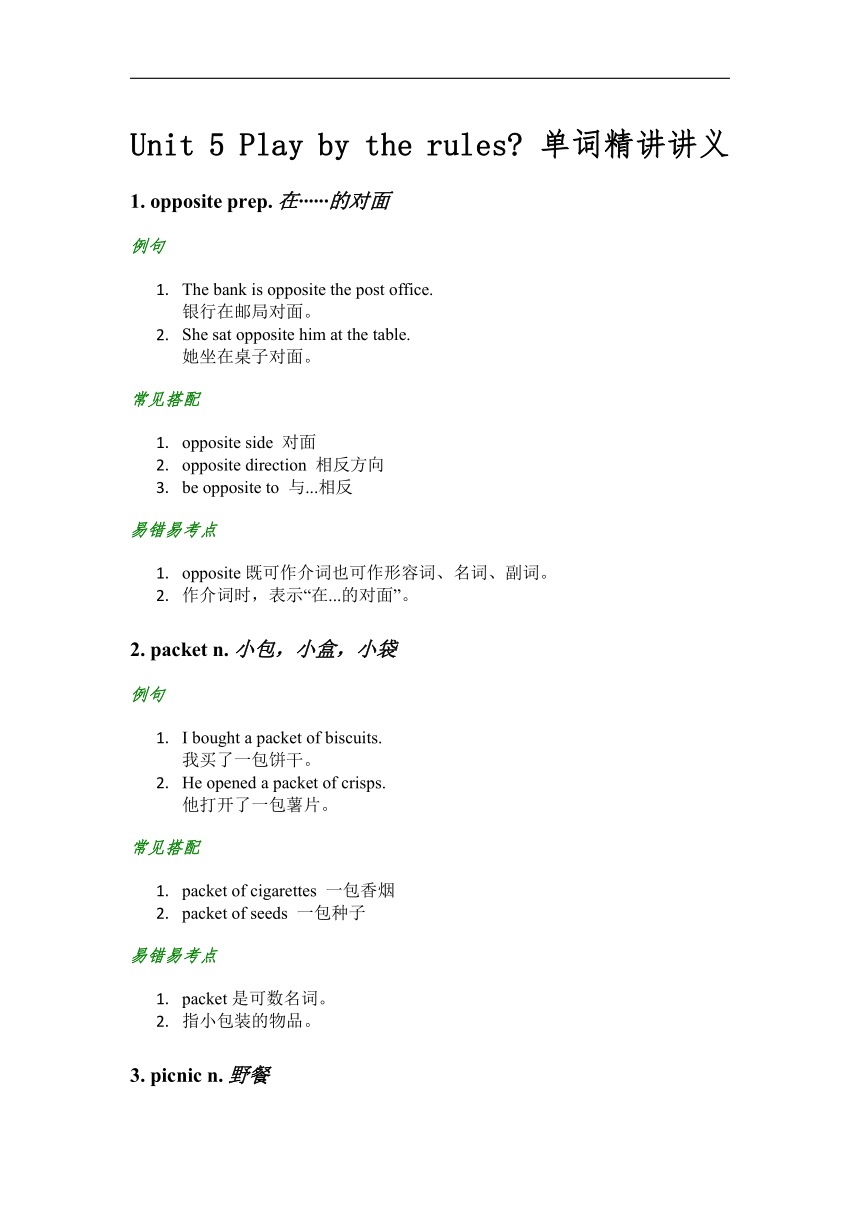
|
|
| 格式 | docx | ||
| 文件大小 | 36.6KB | ||
| 资源类型 | 教案 | ||
| 版本资源 | 外研版 | ||
| 科目 | 英语 | ||
| 更新时间 | 2025-08-24 00:00:00 | ||
图片预览

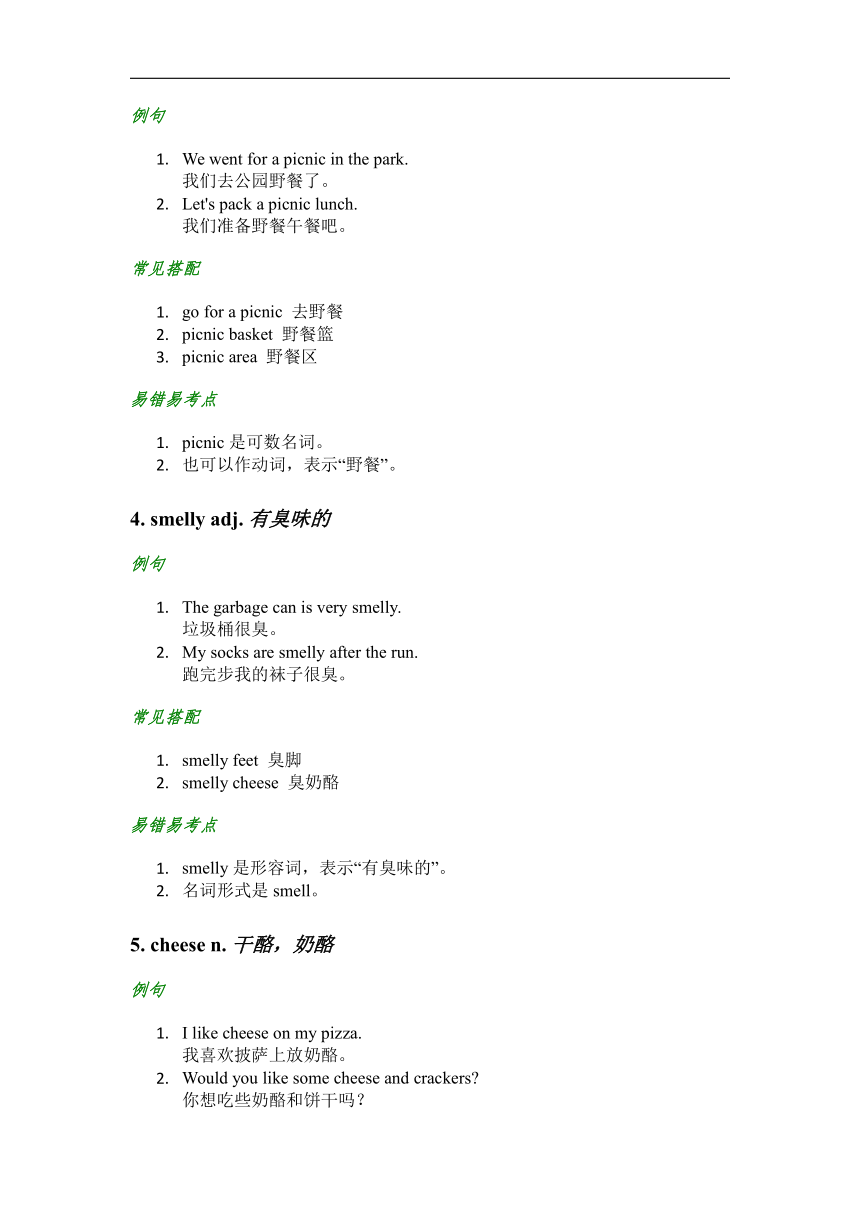
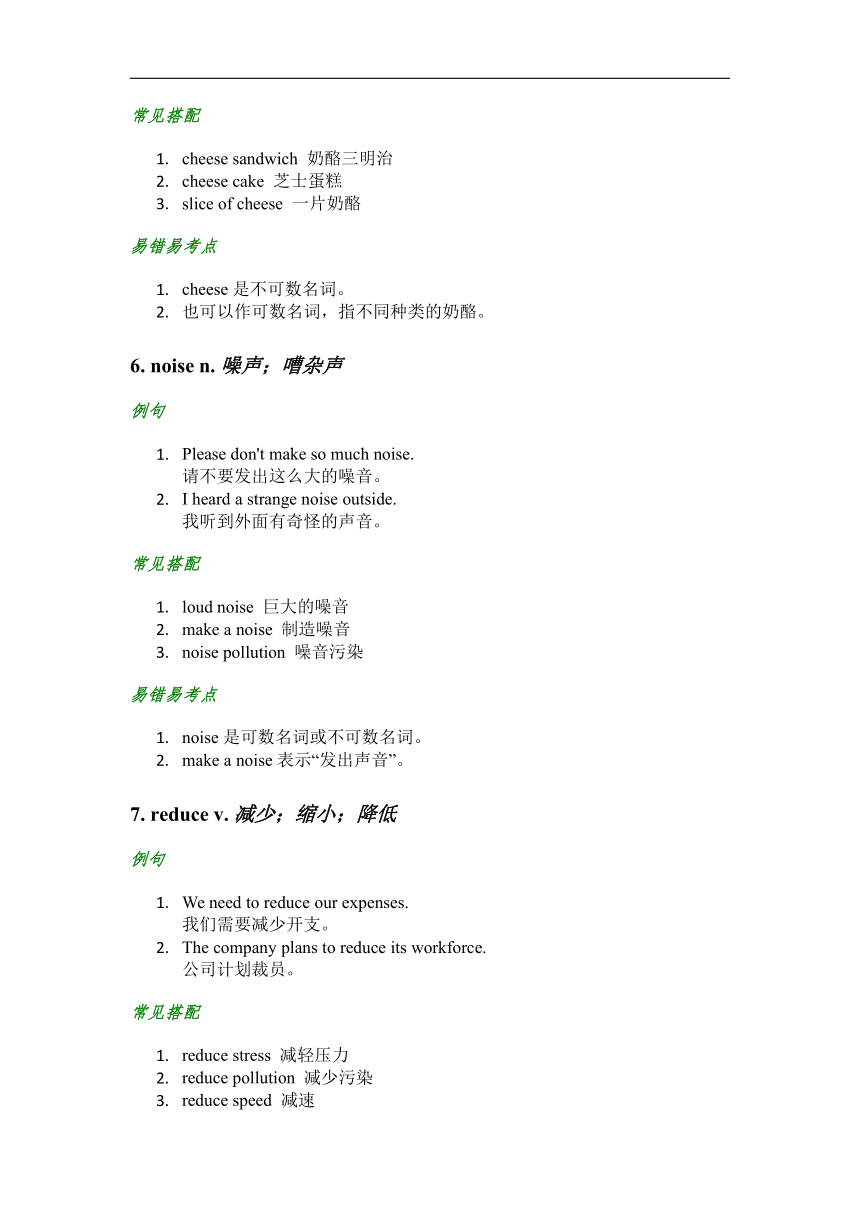
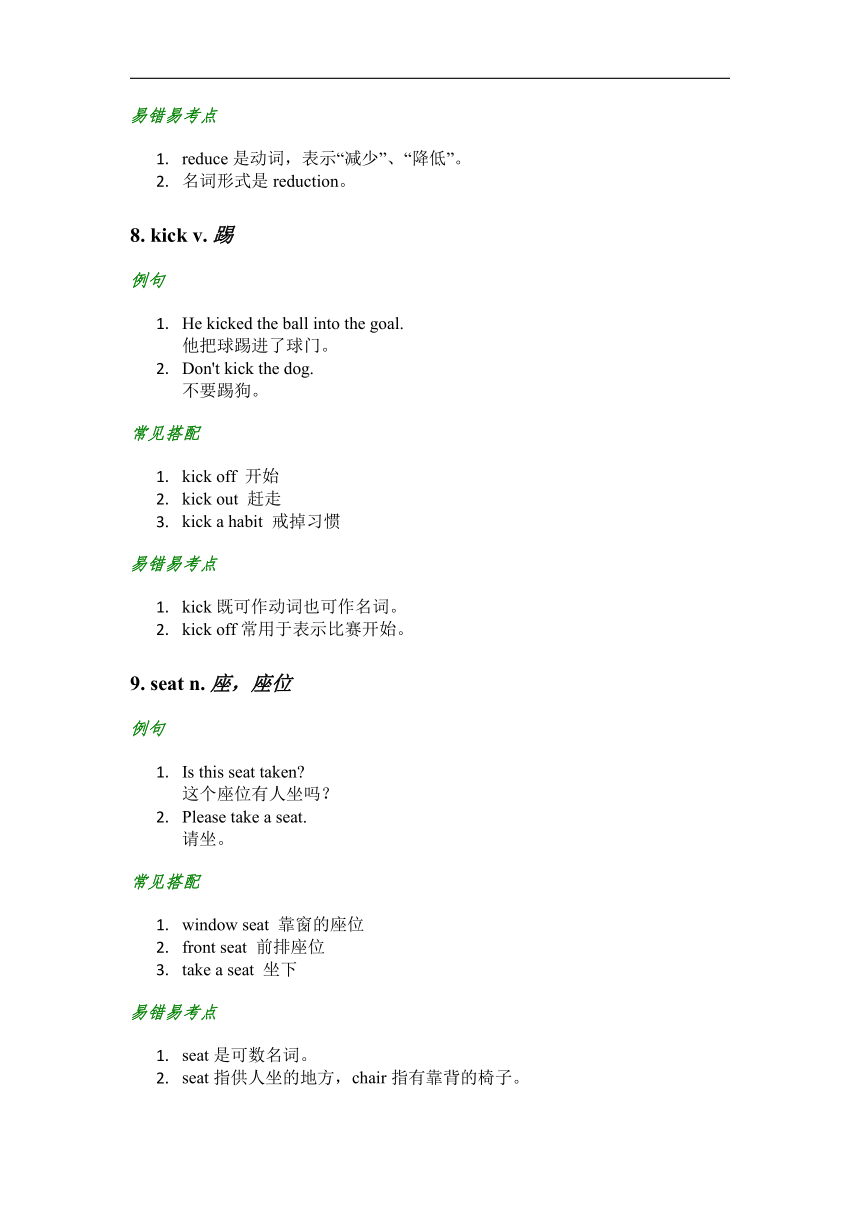
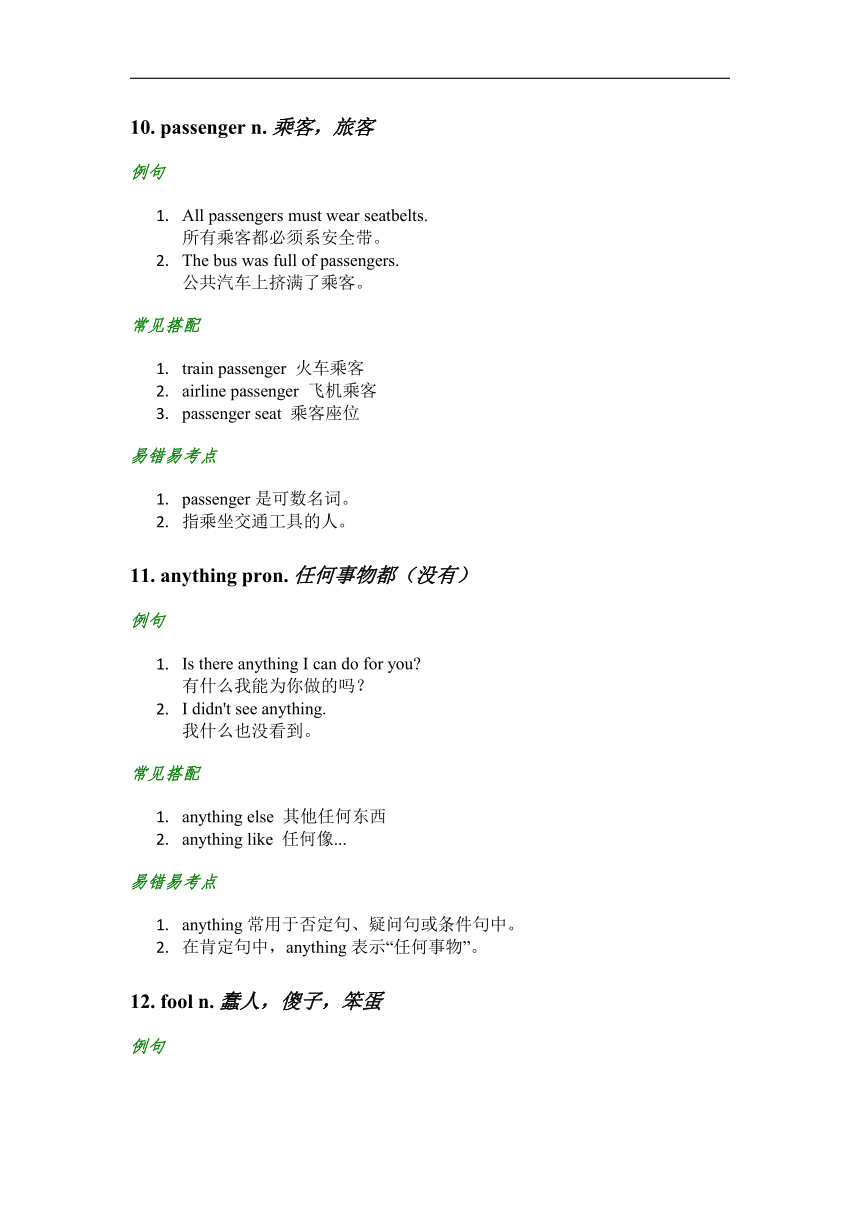
文档简介
Unit 5 Play by the rules 单词精讲讲义
1. opposite prep. 在······的对面
例句
The bank is opposite the post office.
银行在邮局对面。
She sat opposite him at the table.
她坐在桌子对面。
常见搭配
opposite side 对面
opposite direction 相反方向
be opposite to 与...相反
易错易考点
opposite既可作介词也可作形容词、名词、副词。
作介词时,表示“在...的对面”。
2. packet n. 小包,小盒,小袋
例句
I bought a packet of biscuits.
我买了一包饼干。
He opened a packet of crisps.
他打开了一包薯片。
常见搭配
packet of cigarettes 一包香烟
packet of seeds 一包种子
易错易考点
packet是可数名词。
指小包装的物品。
3. picnic n. 野餐
例句
We went for a picnic in the park.
我们去公园野餐了。
Let's pack a picnic lunch.
我们准备野餐午餐吧。
常见搭配
go for a picnic 去野餐
picnic basket 野餐篮
picnic area 野餐区
易错易考点
picnic是可数名词。
也可以作动词,表示“野餐”。
4. smelly adj. 有臭味的
例句
The garbage can is very smelly.
垃圾桶很臭。
My socks are smelly after the run.
跑完步我的袜子很臭。
常见搭配
smelly feet 臭脚
smelly cheese 臭奶酪
易错易考点
smelly是形容词,表示“有臭味的”。
名词形式是smell。
5. cheese n. 干酪,奶酪
例句
I like cheese on my pizza.
我喜欢披萨上放奶酪。
Would you like some cheese and crackers
你想吃些奶酪和饼干吗?
常见搭配
cheese sandwich 奶酪三明治
cheese cake 芝士蛋糕
slice of cheese 一片奶酪
易错易考点
cheese是不可数名词。
也可以作可数名词,指不同种类的奶酪。
6. noise n. 噪声;嘈杂声
例句
Please don't make so much noise.
请不要发出这么大的噪音。
I heard a strange noise outside.
我听到外面有奇怪的声音。
常见搭配
loud noise 巨大的噪音
make a noise 制造噪音
noise pollution 噪音污染
易错易考点
noise是可数名词或不可数名词。
make a noise表示“发出声音”。
7. reduce v. 减少;缩小;降低
例句
We need to reduce our expenses.
我们需要减少开支。
The company plans to reduce its workforce.
公司计划裁员。
常见搭配
reduce stress 减轻压力
reduce pollution 减少污染
reduce speed 减速
易错易考点
reduce是动词,表示“减少”、“降低”。
名词形式是reduction。
8. kick v. 踢
例句
He kicked the ball into the goal.
他把球踢进了球门。
Don't kick the dog.
不要踢狗。
常见搭配
kick off 开始
kick out 赶走
kick a habit 戒掉习惯
易错易考点
kick既可作动词也可作名词。
kick off常用于表示比赛开始。
9. seat n. 座,座位
例句
Is this seat taken
这个座位有人坐吗?
Please take a seat.
请坐。
常见搭配
window seat 靠窗的座位
front seat 前排座位
take a seat 坐下
易错易考点
seat是可数名词。
seat指供人坐的地方,chair指有靠背的椅子。
10. passenger n. 乘客,旅客
例句
All passengers must wear seatbelts.
所有乘客都必须系安全带。
The bus was full of passengers.
公共汽车上挤满了乘客。
常见搭配
train passenger 火车乘客
airline passenger 飞机乘客
passenger seat 乘客座位
易错易考点
passenger是可数名词。
指乘坐交通工具的人。
11. anything pron. 任何事物都(没有)
例句
Is there anything I can do for you
有什么我能为你做的吗?
I didn't see anything.
我什么也没看到。
常见搭配
anything else 其他任何东西
anything like 任何像...
易错易考点
anything常用于否定句、疑问句或条件句中。
在肯定句中,anything表示“任何事物”。
12. fool n. 蠢人,傻子,笨蛋
例句
Don't be a fool.
别当傻瓜。
He made a fool of himself.
他出洋相了。
常见搭配
make a fool of oneself 出洋相
play the fool 装傻
April Fool's Day 愚人节
易错易考点
fool是可数名词。
也可以作动词,表示“愚弄”。
13. sign n. 标记;指示牌,标牌
例句
Follow the signs to the exit.
跟着指示牌走到出口。
He made a sign to me.
他给我做了个手势。
常见搭配
road sign 道路标志
stop sign 停车标志
traffic sign 交通标志
易错易考点
sign是可数名词。
除了表示“标志”,还可以表示“迹象”、“手势”。
14. throat n. 喉咙,咽喉
例句
My throat is sore.
我喉咙痛。
He cleared his throat before speaking.
他清了清嗓子才说话。
常见搭配
sore throat 喉咙痛
clear one's throat 清嗓子
cut one's throat 自杀
易错易考点
throat是可数名词。
clear one's throat表示“清嗓子”。
15. clear your throat (尤指说话前或为引人注意而)清清嗓子
例句
He cleared his throat and began to speak.
他清了清嗓子,开始说话。
She cleared her throat to get their attention.
她清了清嗓子以引起他们的注意。
常见搭配
clear one's throat to do sth. 清嗓子做某事
易错易考点
clear your throat是一个固定短语。
通常表示为了说话或引起注意而发出声音。
16. responsibility n. 责任
例句
It's your responsibility to finish the work.
完成这项工作是你的责任。
She takes her responsibilities seriously.
她认真对待自己的责任。
常见搭配
take responsibility for 对...负责
sense of responsibility 责任感
share responsibility 分担责任
易错易考点
responsibility是可数名词或不可数名词。
形容词形式是responsible。
17. cause n. 原因,起因
例句
What was the cause of the accident
事故的原因是什么?
He is fighting for a good cause.
他正在为一项正义事业而奋斗。
常见搭配
cause and effect 因果关系
main cause 主要原因
good cause 正义事业
易错易考点
cause既可作名词也可作动词。
作名词时,表示“原因”、“事业”。
18. belt n. 腰带,皮带
例句
He tightened his belt.
他系紧了腰带。
Wear your seat belt.
系好安全带。
常见搭配
seat belt 安全带
conveyor belt 传送带
black belt 黑带
易错易考点
belt是可数名词。
seat belt是“安全带”。
19. seat belt 安全带
例句
Please fasten your seat belt.
请系好安全带。
Wearing a seat belt can save lives.
系安全带可以挽救生命。
常见搭配
fasten a seat belt 系安全带
wear a seat belt 系安全带
易错易考点
seat belt是一个名词短语。
指汽车或飞机上的安全带。
20. station n. 车站
例句
I'm going to the train station.
我要去火车站。
Where is the nearest police station
最近的警察局在哪里?
常见搭配
train station 火车站
bus station 公交车站
police station 警察局
易错易考点
station是可数名词。
指交通、服务或广播的场所。
21. flowerpot n. 花盆
例句
She planted flowers in a flowerpot.
她在花盆里种了花。
The flowerpot fell from the window.
花盆从窗户上掉了下来。
常见搭配
ceramic flowerpot 陶瓷花盆
plastic flowerpot 塑料花盆
易错易考点
flowerpot是可数名词。
指用来种植花卉的容器。
22. pick up 捡起
例句
Please pick up the rubbish.
请把垃圾捡起来。
He picked up the phone.
他拿起电话。
常见搭配
pick up speed 加速
pick up a language 学会一门语言
pick up a friend 接朋友
易错易考点
pick up是一个动词短语,除了“捡起”,还有“接(人)”、“学会”、“好转”等含义。
注意区分不同语境下的含义。
23. mess n. 脏乱;凌乱
例句
Your room is a mess.
你的房间一团糟。
Don't make a mess.
不要弄乱。
常见搭配
make a mess 弄乱
in a mess 一团糟
clean up the mess 清理混乱
易错易考点
mess是可数名词或不可数名词。
make a mess表示“弄乱”。
24. honesty n. 诚实,正直;坦诚
例句
Honesty is the best policy.
诚实是最好的策略。
I appreciate your honesty.
我感谢你的坦诚。
常见搭配
with honesty 诚实地
show honesty 表现出诚实
易错易考点
honesty是不可数名词。
形容词形式是honest。
25. spread v. 传播
例句
The news spread quickly.
消息迅速传播开来。
Spread the butter on the bread.
把黄油涂在面包上。
常见搭配
spread awareness 传播意识
spread rumors 散布谣言
spread out 展开
易错易考点
spread的过去式和过去分词都是spread。
除了“传播”,还可以表示“涂抹”、“展开”。
26. law n. 法则,法令
例句
It's against the law to steal.
偷窃是违法的。
The law protects our rights.
法律保护我们的权利。
常见搭配
break the law 违法
obey the law 遵守法律
rule of law 法治
易错易考点
law是可数名词或不可数名词。
指法律、法规或自然法则。
27. lawyer n. 律师
例句
She wants to be a lawyer.
她想成为一名律师。
He consulted a lawyer.
他咨询了一位律师。
常见搭配
criminal lawyer 刑事律师
corporate lawyer 公司律师
become a lawyer 成为律师
易错易考点
lawyer是可数名词。
指从事法律工作的人。
28. urgent adj. 紧急的,急迫的
例句
This is an urgent matter.
这是一个紧急事项。
I need to make an urgent call.
我需要打一个紧急电话。
常见搭配
urgent message 紧急信息
urgent need 紧急需求
urgent care 紧急护理
易错易考点
urgent是形容词,表示“紧急的”。
副词形式是urgently。
29. citizen n. 公民;市民,城镇居民
例句
He is a citizen of Canada.
他是加拿大公民。
All citizens have the right to vote.
所有公民都有投票权。
常见搭配
global citizen 全球公民
responsible citizen 负责任的公民
citizen rights 公民权利
易错易考点
citizen是可数名词。
指一个国家的公民或一个城镇的居民。
30. click v. 点击(鼠标)
例句
Click here to download the file.
点击这里下载文件。
He clicked the mouse button.
他点击了鼠标按钮。
常见搭配
click on 点击
double click 双击
click through 点击浏览
易错易考点
click既可作动词也可作名词。
指用鼠标点击。
31. basic adj. 基础的,基本的,根本的
例句
Learn the basic rules first.
先学习基本规则。
What are the basic needs of humans
人类的基本需求是什么?
常见搭配
basic knowledge 基本知识
basic skills 基本技能
basic salary 基本工资
易错易考点
basic是形容词,表示“基本的”、“基础的”。
副词形式是basically。
32. personal adj. 个人的,私人的
例句
This is my personal opinion.
这是我个人的意见。
Please respect my personal space.
请尊重我的个人空间。
常见搭配
personal information 个人信息
personal belongings 个人物品
personal computer 个人电脑
易错易考点
personal是形容词,表示“个人的”、“私人的”。
名词形式是person。
33. private adj. 个人的,秘密的
例句
This is a private conversation.
这是私人谈话。
He keeps his private life secret.
他保守自己的私生活秘密。
常见搭配
private property 私人财产
private school 私立学校
private life 私生活
易错易考点
private是形容词,表示“私人的”、“秘密的”。
反义词是public。
34. avoid v. 避免
例句
Try to avoid making mistakes.
尽量避免犯错误。
He avoided answering my question.
他避开了我的问题。
常见搭配
avoid doing sth. 避免做某事
avoid contact 避免接触
avoid trouble 避免麻烦
易错易考点
avoid是动词,后接动名词。
表示“避免”、“避开”。
35. address n. 地址
例句
What's your address
你的地址是什么?
Please write your name and address.
请写下你的姓名和地址。
常见搭配
email address 电子邮件地址
home address 家庭住址
change address 更改地址
易错易考点
address是可数名词。
也可以作动词,表示“处理”、“称呼”。
36. passport n. 护照
例句
I need to renew my passport.
我需要更新我的护照。
Show your passport at the customs.
在海关出示你的护照。
常见搭配
valid passport 有效护照
passport control 护照检查
passport photo 护照照片
易错易考点
passport是可数名词。
指用于国际旅行的官方文件。
37. limit v./n. 限制,限定
例句
We need to limit the amount of sugar we eat.
我们需要限制糖的摄入量。
There's a speed limit on this road.
这条路有限速。
常见搭配
set a limit 设定限制
go beyond the limit 超出限制
no limit 没有限制
易错易考点
limit既可作动词也可作名词。
表示“限制”、“界限”。
38. careless adj. 不小心的,粗心的,疏忽的
例句
He made a careless mistake.
他犯了一个粗心的错误。
Don't be careless with your money.
不要粗心大意地花钱。
常见搭配
careless driving 粗心驾驶
careless mistake 粗心错误
易错易考点
careless是形容词,表示“粗心的”。
反义词是careful。
39. aware adj. 注意到的,察觉到的
例句
Are you aware of the risks
你意识到风险了吗?
I became aware of someone watching me.
我察觉到有人在看着我。
常见搭配
be aware of 意识到
become aware of 察觉到
fully aware 完全意识到
易错易考点
aware是形容词,常与be动词连用。
后接of或that从句。
40. cheat v. 欺诈,欺骗
例句
Don't cheat on the exam.
不要在考试中作弊。
He cheated me out of my money.
他骗走了我的钱。
常见搭配
cheat on an exam 考试作弊
cheat sheet 作弊小抄
cheat death 逃过一劫
易错易考点
cheat既可作动词也可作名词。
表示“欺骗”、“作弊”。
41. trust v./n. 信任,信赖,相信
例句
I trust him completely.
我完全信任他。
She has a lot of trust in her friends.
她非常信任她的朋友。
常见搭配
trust in 信任
build trust 建立信任
break trust 破坏信任
易错易考点
trust既可作动词也可作名词。
表示“信任”、“信赖”。
42. enemy n. 敌人
例句
They are our enemies.
他们是我们的敌人。
He made an enemy of his former friend.
他把以前的朋友变成了敌人。
常见搭配
common enemy 共同的敌人
sworn enemy 死敌
make an enemy of 与...为敌
易错易考点
enemy是可数名词。
指敌对的人或国家。
43. behave v. 表现
例句
The children behaved well.
孩子们表现得很好。
How should I behave at the party
我在派对上应该怎么表现?
常见搭配
behave oneself 表现得体
behave badly 表现不好
behave like 表现得像
易错易考点
behave是动词,表示“表现”、“行为”。
名词形式是behavior。
44. cyberbullying n. 网络霸凌(欺凌)
例句
Cyberbullying is a serious problem among teenagers.
网络霸凌是青少年中一个严重的问题。
We need to educate people about cyberbullying.
我们需要教育人们关于网络霸凌的知识。
常见搭配
prevent cyberbullying 预防网络霸凌
cyberbullying awareness 网络霸凌意识
易错易考点
cyberbullying是不可数名词。
指通过互联网或电子设备进行的欺凌行为
1. opposite prep. 在······的对面
例句
The bank is opposite the post office.
银行在邮局对面。
She sat opposite him at the table.
她坐在桌子对面。
常见搭配
opposite side 对面
opposite direction 相反方向
be opposite to 与...相反
易错易考点
opposite既可作介词也可作形容词、名词、副词。
作介词时,表示“在...的对面”。
2. packet n. 小包,小盒,小袋
例句
I bought a packet of biscuits.
我买了一包饼干。
He opened a packet of crisps.
他打开了一包薯片。
常见搭配
packet of cigarettes 一包香烟
packet of seeds 一包种子
易错易考点
packet是可数名词。
指小包装的物品。
3. picnic n. 野餐
例句
We went for a picnic in the park.
我们去公园野餐了。
Let's pack a picnic lunch.
我们准备野餐午餐吧。
常见搭配
go for a picnic 去野餐
picnic basket 野餐篮
picnic area 野餐区
易错易考点
picnic是可数名词。
也可以作动词,表示“野餐”。
4. smelly adj. 有臭味的
例句
The garbage can is very smelly.
垃圾桶很臭。
My socks are smelly after the run.
跑完步我的袜子很臭。
常见搭配
smelly feet 臭脚
smelly cheese 臭奶酪
易错易考点
smelly是形容词,表示“有臭味的”。
名词形式是smell。
5. cheese n. 干酪,奶酪
例句
I like cheese on my pizza.
我喜欢披萨上放奶酪。
Would you like some cheese and crackers
你想吃些奶酪和饼干吗?
常见搭配
cheese sandwich 奶酪三明治
cheese cake 芝士蛋糕
slice of cheese 一片奶酪
易错易考点
cheese是不可数名词。
也可以作可数名词,指不同种类的奶酪。
6. noise n. 噪声;嘈杂声
例句
Please don't make so much noise.
请不要发出这么大的噪音。
I heard a strange noise outside.
我听到外面有奇怪的声音。
常见搭配
loud noise 巨大的噪音
make a noise 制造噪音
noise pollution 噪音污染
易错易考点
noise是可数名词或不可数名词。
make a noise表示“发出声音”。
7. reduce v. 减少;缩小;降低
例句
We need to reduce our expenses.
我们需要减少开支。
The company plans to reduce its workforce.
公司计划裁员。
常见搭配
reduce stress 减轻压力
reduce pollution 减少污染
reduce speed 减速
易错易考点
reduce是动词,表示“减少”、“降低”。
名词形式是reduction。
8. kick v. 踢
例句
He kicked the ball into the goal.
他把球踢进了球门。
Don't kick the dog.
不要踢狗。
常见搭配
kick off 开始
kick out 赶走
kick a habit 戒掉习惯
易错易考点
kick既可作动词也可作名词。
kick off常用于表示比赛开始。
9. seat n. 座,座位
例句
Is this seat taken
这个座位有人坐吗?
Please take a seat.
请坐。
常见搭配
window seat 靠窗的座位
front seat 前排座位
take a seat 坐下
易错易考点
seat是可数名词。
seat指供人坐的地方,chair指有靠背的椅子。
10. passenger n. 乘客,旅客
例句
All passengers must wear seatbelts.
所有乘客都必须系安全带。
The bus was full of passengers.
公共汽车上挤满了乘客。
常见搭配
train passenger 火车乘客
airline passenger 飞机乘客
passenger seat 乘客座位
易错易考点
passenger是可数名词。
指乘坐交通工具的人。
11. anything pron. 任何事物都(没有)
例句
Is there anything I can do for you
有什么我能为你做的吗?
I didn't see anything.
我什么也没看到。
常见搭配
anything else 其他任何东西
anything like 任何像...
易错易考点
anything常用于否定句、疑问句或条件句中。
在肯定句中,anything表示“任何事物”。
12. fool n. 蠢人,傻子,笨蛋
例句
Don't be a fool.
别当傻瓜。
He made a fool of himself.
他出洋相了。
常见搭配
make a fool of oneself 出洋相
play the fool 装傻
April Fool's Day 愚人节
易错易考点
fool是可数名词。
也可以作动词,表示“愚弄”。
13. sign n. 标记;指示牌,标牌
例句
Follow the signs to the exit.
跟着指示牌走到出口。
He made a sign to me.
他给我做了个手势。
常见搭配
road sign 道路标志
stop sign 停车标志
traffic sign 交通标志
易错易考点
sign是可数名词。
除了表示“标志”,还可以表示“迹象”、“手势”。
14. throat n. 喉咙,咽喉
例句
My throat is sore.
我喉咙痛。
He cleared his throat before speaking.
他清了清嗓子才说话。
常见搭配
sore throat 喉咙痛
clear one's throat 清嗓子
cut one's throat 自杀
易错易考点
throat是可数名词。
clear one's throat表示“清嗓子”。
15. clear your throat (尤指说话前或为引人注意而)清清嗓子
例句
He cleared his throat and began to speak.
他清了清嗓子,开始说话。
She cleared her throat to get their attention.
她清了清嗓子以引起他们的注意。
常见搭配
clear one's throat to do sth. 清嗓子做某事
易错易考点
clear your throat是一个固定短语。
通常表示为了说话或引起注意而发出声音。
16. responsibility n. 责任
例句
It's your responsibility to finish the work.
完成这项工作是你的责任。
She takes her responsibilities seriously.
她认真对待自己的责任。
常见搭配
take responsibility for 对...负责
sense of responsibility 责任感
share responsibility 分担责任
易错易考点
responsibility是可数名词或不可数名词。
形容词形式是responsible。
17. cause n. 原因,起因
例句
What was the cause of the accident
事故的原因是什么?
He is fighting for a good cause.
他正在为一项正义事业而奋斗。
常见搭配
cause and effect 因果关系
main cause 主要原因
good cause 正义事业
易错易考点
cause既可作名词也可作动词。
作名词时,表示“原因”、“事业”。
18. belt n. 腰带,皮带
例句
He tightened his belt.
他系紧了腰带。
Wear your seat belt.
系好安全带。
常见搭配
seat belt 安全带
conveyor belt 传送带
black belt 黑带
易错易考点
belt是可数名词。
seat belt是“安全带”。
19. seat belt 安全带
例句
Please fasten your seat belt.
请系好安全带。
Wearing a seat belt can save lives.
系安全带可以挽救生命。
常见搭配
fasten a seat belt 系安全带
wear a seat belt 系安全带
易错易考点
seat belt是一个名词短语。
指汽车或飞机上的安全带。
20. station n. 车站
例句
I'm going to the train station.
我要去火车站。
Where is the nearest police station
最近的警察局在哪里?
常见搭配
train station 火车站
bus station 公交车站
police station 警察局
易错易考点
station是可数名词。
指交通、服务或广播的场所。
21. flowerpot n. 花盆
例句
She planted flowers in a flowerpot.
她在花盆里种了花。
The flowerpot fell from the window.
花盆从窗户上掉了下来。
常见搭配
ceramic flowerpot 陶瓷花盆
plastic flowerpot 塑料花盆
易错易考点
flowerpot是可数名词。
指用来种植花卉的容器。
22. pick up 捡起
例句
Please pick up the rubbish.
请把垃圾捡起来。
He picked up the phone.
他拿起电话。
常见搭配
pick up speed 加速
pick up a language 学会一门语言
pick up a friend 接朋友
易错易考点
pick up是一个动词短语,除了“捡起”,还有“接(人)”、“学会”、“好转”等含义。
注意区分不同语境下的含义。
23. mess n. 脏乱;凌乱
例句
Your room is a mess.
你的房间一团糟。
Don't make a mess.
不要弄乱。
常见搭配
make a mess 弄乱
in a mess 一团糟
clean up the mess 清理混乱
易错易考点
mess是可数名词或不可数名词。
make a mess表示“弄乱”。
24. honesty n. 诚实,正直;坦诚
例句
Honesty is the best policy.
诚实是最好的策略。
I appreciate your honesty.
我感谢你的坦诚。
常见搭配
with honesty 诚实地
show honesty 表现出诚实
易错易考点
honesty是不可数名词。
形容词形式是honest。
25. spread v. 传播
例句
The news spread quickly.
消息迅速传播开来。
Spread the butter on the bread.
把黄油涂在面包上。
常见搭配
spread awareness 传播意识
spread rumors 散布谣言
spread out 展开
易错易考点
spread的过去式和过去分词都是spread。
除了“传播”,还可以表示“涂抹”、“展开”。
26. law n. 法则,法令
例句
It's against the law to steal.
偷窃是违法的。
The law protects our rights.
法律保护我们的权利。
常见搭配
break the law 违法
obey the law 遵守法律
rule of law 法治
易错易考点
law是可数名词或不可数名词。
指法律、法规或自然法则。
27. lawyer n. 律师
例句
She wants to be a lawyer.
她想成为一名律师。
He consulted a lawyer.
他咨询了一位律师。
常见搭配
criminal lawyer 刑事律师
corporate lawyer 公司律师
become a lawyer 成为律师
易错易考点
lawyer是可数名词。
指从事法律工作的人。
28. urgent adj. 紧急的,急迫的
例句
This is an urgent matter.
这是一个紧急事项。
I need to make an urgent call.
我需要打一个紧急电话。
常见搭配
urgent message 紧急信息
urgent need 紧急需求
urgent care 紧急护理
易错易考点
urgent是形容词,表示“紧急的”。
副词形式是urgently。
29. citizen n. 公民;市民,城镇居民
例句
He is a citizen of Canada.
他是加拿大公民。
All citizens have the right to vote.
所有公民都有投票权。
常见搭配
global citizen 全球公民
responsible citizen 负责任的公民
citizen rights 公民权利
易错易考点
citizen是可数名词。
指一个国家的公民或一个城镇的居民。
30. click v. 点击(鼠标)
例句
Click here to download the file.
点击这里下载文件。
He clicked the mouse button.
他点击了鼠标按钮。
常见搭配
click on 点击
double click 双击
click through 点击浏览
易错易考点
click既可作动词也可作名词。
指用鼠标点击。
31. basic adj. 基础的,基本的,根本的
例句
Learn the basic rules first.
先学习基本规则。
What are the basic needs of humans
人类的基本需求是什么?
常见搭配
basic knowledge 基本知识
basic skills 基本技能
basic salary 基本工资
易错易考点
basic是形容词,表示“基本的”、“基础的”。
副词形式是basically。
32. personal adj. 个人的,私人的
例句
This is my personal opinion.
这是我个人的意见。
Please respect my personal space.
请尊重我的个人空间。
常见搭配
personal information 个人信息
personal belongings 个人物品
personal computer 个人电脑
易错易考点
personal是形容词,表示“个人的”、“私人的”。
名词形式是person。
33. private adj. 个人的,秘密的
例句
This is a private conversation.
这是私人谈话。
He keeps his private life secret.
他保守自己的私生活秘密。
常见搭配
private property 私人财产
private school 私立学校
private life 私生活
易错易考点
private是形容词,表示“私人的”、“秘密的”。
反义词是public。
34. avoid v. 避免
例句
Try to avoid making mistakes.
尽量避免犯错误。
He avoided answering my question.
他避开了我的问题。
常见搭配
avoid doing sth. 避免做某事
avoid contact 避免接触
avoid trouble 避免麻烦
易错易考点
avoid是动词,后接动名词。
表示“避免”、“避开”。
35. address n. 地址
例句
What's your address
你的地址是什么?
Please write your name and address.
请写下你的姓名和地址。
常见搭配
email address 电子邮件地址
home address 家庭住址
change address 更改地址
易错易考点
address是可数名词。
也可以作动词,表示“处理”、“称呼”。
36. passport n. 护照
例句
I need to renew my passport.
我需要更新我的护照。
Show your passport at the customs.
在海关出示你的护照。
常见搭配
valid passport 有效护照
passport control 护照检查
passport photo 护照照片
易错易考点
passport是可数名词。
指用于国际旅行的官方文件。
37. limit v./n. 限制,限定
例句
We need to limit the amount of sugar we eat.
我们需要限制糖的摄入量。
There's a speed limit on this road.
这条路有限速。
常见搭配
set a limit 设定限制
go beyond the limit 超出限制
no limit 没有限制
易错易考点
limit既可作动词也可作名词。
表示“限制”、“界限”。
38. careless adj. 不小心的,粗心的,疏忽的
例句
He made a careless mistake.
他犯了一个粗心的错误。
Don't be careless with your money.
不要粗心大意地花钱。
常见搭配
careless driving 粗心驾驶
careless mistake 粗心错误
易错易考点
careless是形容词,表示“粗心的”。
反义词是careful。
39. aware adj. 注意到的,察觉到的
例句
Are you aware of the risks
你意识到风险了吗?
I became aware of someone watching me.
我察觉到有人在看着我。
常见搭配
be aware of 意识到
become aware of 察觉到
fully aware 完全意识到
易错易考点
aware是形容词,常与be动词连用。
后接of或that从句。
40. cheat v. 欺诈,欺骗
例句
Don't cheat on the exam.
不要在考试中作弊。
He cheated me out of my money.
他骗走了我的钱。
常见搭配
cheat on an exam 考试作弊
cheat sheet 作弊小抄
cheat death 逃过一劫
易错易考点
cheat既可作动词也可作名词。
表示“欺骗”、“作弊”。
41. trust v./n. 信任,信赖,相信
例句
I trust him completely.
我完全信任他。
She has a lot of trust in her friends.
她非常信任她的朋友。
常见搭配
trust in 信任
build trust 建立信任
break trust 破坏信任
易错易考点
trust既可作动词也可作名词。
表示“信任”、“信赖”。
42. enemy n. 敌人
例句
They are our enemies.
他们是我们的敌人。
He made an enemy of his former friend.
他把以前的朋友变成了敌人。
常见搭配
common enemy 共同的敌人
sworn enemy 死敌
make an enemy of 与...为敌
易错易考点
enemy是可数名词。
指敌对的人或国家。
43. behave v. 表现
例句
The children behaved well.
孩子们表现得很好。
How should I behave at the party
我在派对上应该怎么表现?
常见搭配
behave oneself 表现得体
behave badly 表现不好
behave like 表现得像
易错易考点
behave是动词,表示“表现”、“行为”。
名词形式是behavior。
44. cyberbullying n. 网络霸凌(欺凌)
例句
Cyberbullying is a serious problem among teenagers.
网络霸凌是青少年中一个严重的问题。
We need to educate people about cyberbullying.
我们需要教育人们关于网络霸凌的知识。
常见搭配
prevent cyberbullying 预防网络霸凌
cyberbullying awareness 网络霸凌意识
易错易考点
cyberbullying是不可数名词。
指通过互联网或电子设备进行的欺凌行为
同课章节目录
